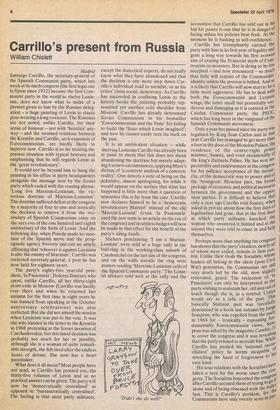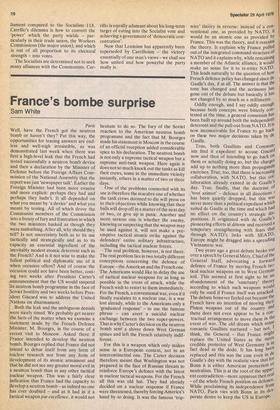Carrillo's present from Russia
William Chislett
Madrid Santiago Carrillo, the secretary-general of the Spanish Communist party, which last week at its ninth congress (the first legal one in Spain since 1932) became the first Communist party in the world to shelve Leninism, does not know what to make of a present given to him by the Russian delegation — a huge painting of Lenin in classic pose wearing a long overcoat. The Russians are not noted, unlike Carrillo, for their sense of humour — not with 'heretics' anyway — and the strained relations between the Kremlin and Carrillo, arch-exponent of Eurocommunism, are hardly likely to improve now. Carrillo is so far treating the present situation with typical bravura and emphasising that he still regards Lenin as the 'great revolutionary'. It would not be beyond him to hang the painting in his office at party headquarters alongside the message sent by the Soviet party which ended with the rousing phrase: 'Long live Marxism-Leninism, the victorious doctrine of Marxism-Leninism'. The doctrine suffered defeat at the congress by a majority of four to one and ironically the decision to remove it from the vocabulary of Spanish Communism came on the very eve of the one hundred and eighth anniversary of the birth of Lenin. And the following day, when Pravda made no mention of the Spanish move and the propaganda agency Novosty put out an article affirming that 'whoever is against Leninism is also the enemy of Marxism', Carrillo was reelected secretary-general, a post he has now held for eighteen years. The party's eighty-two year-old pres ident, 'la Pasionaria', Dolores Ibarruri, who spent, unlike Carrillo, all her thirty-eight years exile in Moscow (Carrillo was hardly ever there and when he returned last autumn for the first time in eight years he was banned from speaking at the October anniversary celebrations) was also reelected. But she did not attend the session when Leninism was put to the vote. It was she who handed in the letter to the Kremlin in 1968 protesting atthe Soviet invasion of Czechoslovakia, but this latest decision was probably too much for her or possibly, although she is a woman of quite remarkable strength, she felt tired after the endless hours of debate. She now has a heart pacemaker. What does it all mean? Most people have not read, as Carrillo has pointed out, the thirty-five volumes of Lenin and so no practical answer can be given. The party will now be 'democratically centralised' as opposed to 'bureaucratically centralised'. The feeling is that most party militants, except the dialectical experts, do not really know what they have abandoned and that the decision is one more step down Carrillo's individual road to socialist, or as his critics' claim social, democracy. As Carrillo has succeeded in confining Lenin to the history books the painting probably represented yet another cold shoulder from Moscow. Carrillo has already denounced Soviet Communism in his bestseller 'Eurocommunism and the State' for failing to build the 'State which Lenin imagined'; and now he cannot easily turn his back on the past. It is an ambivalent situation — while shelving Leninism Carrillo has already been at pains to stress that this does not mean abandoning the doctrine but merely adapting it to new circumstances, applying Marx's dictum of 'a concrete analysis of a concrete reality'. One detects a note of being on the defensive, almost apologising, for while it would appear on the surface that what has happened is little more than a question of semantics this is far from the case. Carrillo now declares himself to be a 'democratic revolutionary Marxist' instead of the old 'Marxist-Leninist' (even 'la Pasionaria' used the new term in an article on the eve of the congress) and doubtless badges will now be made to that effect for the benefit of the party's ailing funds. Stickers proclaiming 'I am a MarxistLeninist' were sold at a huge rally in the bull-ring in the working-class suburb of Carabanchel on the last day of the congress, and on the walls outside the ring were posters reading 'Marxism-Leninism cells of the Spanish Communist party.' The Leninist stickers sold well at the rally and the accusation that Carrillo has sold out in his, bid for power is one that he is in danger 01 facing unless his policies bear fruit. At the moment he is basking in self-confidence. Carrillo has triumphantly carried the party with him in its first year of legality and, gone a long way towards his first avower' aim of erasing the Francoist myth of Corn' munists as monsters. But in doing so he has accepted — and now renounced — so much, that little will remain of the Communists identity unless the process is halted. And so it is likely that Carrillo will now start to be a little more aggressive. He has to deal with both the Eurocommunist and Leninist wings, the latter small but potentially voe. iferous and damaging as it is centred in the Catalan Communist party, the PSUC, which has long been in the vanguard of the Spanish Communist movement. Only a year has passed since the party was legalised by King Juan Carlos and in that year Carrillo has managed to get more that' afoot in the door of the Moncloa Palace, the residence of the centre-right printer minister, Suarez, and even occasionally 0' the king's Zarzuela Palace. He has won res. pectability and endorsement at the congress for his policies: acceptance of the moiler' chy, of the democratic way to power and of the 'bourgeois' Moncloa pact, the broad package of economic and political measures between the government and the oPP°sition parties. It is difficult to believe that only a year ago Carrillo told Suarez, whet; asked in private about how the first days °' legalisation had gone, that at the first door at which party militants knocked the woman who answered it fainted and at the second they were told to come in and helP themselves. Perhaps more than anything the congressi has shown that the party's leaders nearly al of whom were exiled, remain in firm con trol. Unlike their rivals the Socialists, whose, leaders all belong to the silent (post Civa War) generation the Communists are st,t11 ,very much led by the old, now slightlY renovated, guard. The reelection of 'la Pasionaria' can only be interpreted as the, party wishing to maintain her, old and out °' touch though she is, as a symbol. Critic! would say as a relic of the past. Thls basically Stalinist past was foreefullY denounced in a book last autumn by Semprun, who was expelled from the par" in 1964 for — ironically, — espousing flay. damentally Eurocommunist views. Sarn16 prun was asked by the 'magazine Cambi . a to cover the congress and it was reveal: that the party refused to accredit him. Wind Carrillo has pushed his 'national rectiff cilation' policy he seems incapable :is stretching the hand of forgiveness to own kind. His sour relations with the Socialists' taken a turn for the worse since the gress. The Socialists boycotted the congre it after Carrillo accused them of trying to Cot alone and of being obsessed with the hate,' c box. This is Carrillo's problem, for dr. Communists have only twenty seats in
liament compared to the Socialists 118. Carrillo's dilemma is how to convert the 'power' which the party wields — particularly in their trade union, the Workers Commissions (the major union), and which is out of all proportion to its electoral strength — into votes.
The Socialists are determined not to seek many alliances with the Communists. Car rillo is equally adamant about his long-term target of eating into the Socialist vote and achieving a government of 'democratic concentration'.
Now that Leninism has apparently been superseded by Carrilloism — the victory essentially of one man's views —we shall see how united and how powerful the party really is.



































 Previous page
Previous page